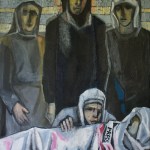
Among the largely unnoticed sufferers in this conflict are the Palestinians and one story in particular has attracted attention in Israel because of a brother’s effort to rescue his sister from the Syrian cauldron. He is the famous Arab artist Abed Abdi, who lives and works in Haifa and was my friend and guide when I was a Fulbright scholar at the University of Haifa last spring.

Throughout the civil war the Palestinian camps have served as targets for shelling, shooting, and car bombs by both sides. Many deaths, injuries, and kidnappings have been recorded by UNRWA.
Abed Abdi’s sister Lutfia, now 84 years old, has been a refugee for sixty-five years of her life. Born in Haifa, she fled with her mother, sisters, and brothers in the spring of 1948 when the city was captured by Israeli forces. They had expected to return to their home when the fighting ended, but they were barred by Israel from coming back. For the next three years the family lived in camps in Lebanon and in Syria until their father, who had remained in Haifa, managed to obtain reentry permits on grounds of family reunification. But Lutfia, who by then had married, had to remain with her Palestinian husband in Syria where she gave birth to eleven children.
Until recently Lutfia lived in Yarmouk, a two-square mile district in the outskirts of Damascus. Established in 1957, it had the largest concentration of Palestinian refugees (some 150,000) and looked more like an urban quarter than a camp. Over the years Lutfia visited her birthplace several times when Israel permitted Palestinian refugees to pay family visits; but each time she had to return to Syria. After Yarmouk came under attack, Lutfia found shelter in her daughter’s apartment in Damascus and communicated by telephone with her sisters in Haifa who learned that her health has deteriorated considerably and physical conditions become more and more dangerous every day.
Abed Abdi, who holds the title “Honored Citizen of Haifa” for his many artistic achievements, hopes to raise public awareness of Lutfia’s peril and those of all the Palestinians in Syria. On May 17 an exhibition of his works will open in Haifa.
Although Lutfia’s plight represents only one instance of the immense tragedy occurring in Syria, it has an important political dimension. Under current Israeli law Abed Abdi cannot bring his sister home despite the fact that her parents, grandparents, and great grandparents were all born in Haifa. Until the Israeli government and the Palestinian Authority resume their long-stalled negotiations, conclude a Final Status agreement, and settle the issue of the refugees, Lutfia must remain in the violent land of her exile.
Carole Fink was formerly a professor of history at the University of North Carolina at Wilmington and The Ohio State University. She lives in Wilmington.
Published: Tuesday, March 26, 2013 at 8:24 a.m.



















